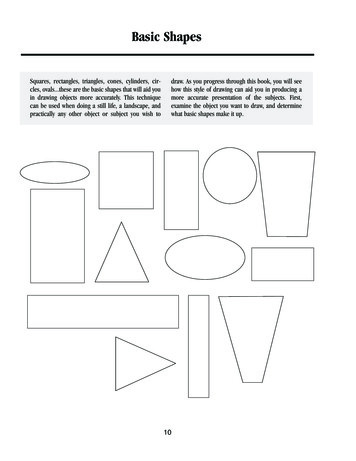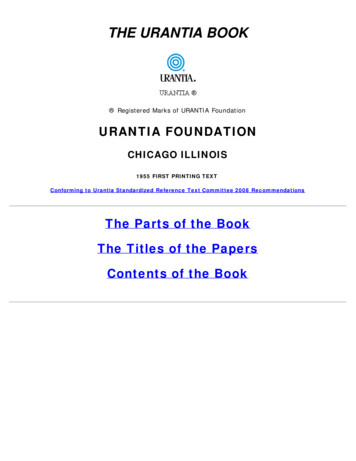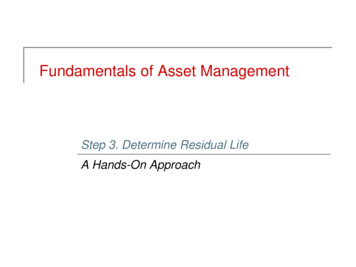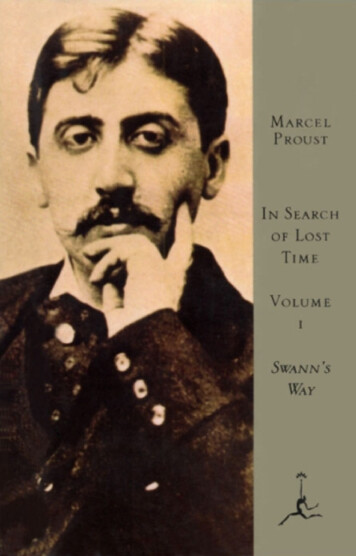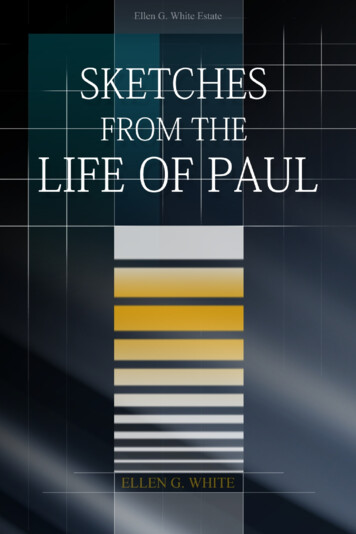
Transcription
Sketches from the Life ofPaulEllen G. White1883
Information about this BookOverviewThis ePub publication is provided as a service of the EllenG. White Estate. It is part of a larger collection. Please visitthe Ellen G. White Estate website for a complete list of availablepublications.About the AuthorEllen G. White (1827-1915) is considered the most widelytranslated American author, her works having been published inmore than 160 languages. She wrote more than 100,000 pages ona wide variety of spiritual and practical topics. Guided by the HolySpirit, she exalted Jesus and pointed to the Scriptures as the basisof one’s faith.Further LinksA Brief Biography of Ellen G. WhiteAbout the Ellen G. White EstateEnd User License AgreementThe viewing, printing or downloading of this book grants youonly a limited, nonexclusive and nontransferable license for usesolely by you for your own personal use. This license does notpermit republication, distribution, assignment, sublicense, sale,preparation of derivative works, or other use. Any unauthorizeduse of this book terminates the license granted hereby. Copyright 2010 by the Ellen G. White Estate, Inc.
For more information about the author, publishers, or how youcan support this service, please contact the Ellen G. White Estate:(email address). We are thankful for your interest and feedback andwish you God’s blessing as you read.
ContentsInformation about this Book . . . . . . . . . . .Overview . . . . . . . . . . . . . . . . . .About the Author . . . . . . . . . . . . . .Further Links . . . . . . . . . . . . . . . .End User License Agreement . . . . . . . .Preface . . . . . . . . . . . . . . . . . . . . . . .Chapter I—Saul the Persecutor . . . . . . . . . .Chapter II—Conversion of Saul . . . . . . . . . .Chapter III—Paul Enters Upon His Ministry . . .Chapter IV—Ordination of Paul and Barnabas . .Chapter V—Preaching Among the Heathen . . .Chapter VI—Jew and Gentile . . . . . . . . . . .Chapter VII—Imprisonment of Paul and Silas . .Chapter VIII—Opposition at Thessalonica . . . .Chapter IX—Paul at Berea and Athens . . . . . .Chapter X—Paul at Corinth . . . . . . . . . . . .Chapter XI—Epistles to the Thessalonians . . . .Chapter XII—Apollos at Corinth . . . . . . . . .Chapter XIII—Paul at Ephesus . . . . . . . . . .Chapter XIV—Trials and Victories of Paul . . . .Chapter XV—Paul to the Corinthians . . . . . . .Chapter XVI—Second Epistle to the CorinthiansChapter XVII—Paul Revisits Corinth . . . . . .Chapter XVIII—Paul’s Last Journey to JerusalemChapter XIX—Meeting with the Elders . . . . .Chapter XX—Paul a Prisoner . . . . . . . . . . .Chapter XXI—Trial at Caesarea . . . . . . . . .Chapter XXII—Paul Appeals to Caesar . . . . .Chapter XXIII—Address Before Agrippa . . . .Chapter XXIV—The Voyage and Shipwreck . . .Chapter XXV—Arrival at Rome . . . . . . . . .Chapter XXVI—Sojourn at Rome . . . . . . . .Chapter XXVII—Caesar’s Household . . . . . 207214234246252261272280289
Chapter XXVIII—Paul at Liberty . . . . . . .Chapter XXIX—The Final Arrest . . . . . . .Chapter XXX—Paul Before Nero . . . . . . .Chapter XXXI—Paul’s Last Letter . . . . . . .Chapter XXXII—Martyrdom of Paul and Peter.301304310318328
PrefaceAll who have read the life of Christ as presented in volumestwo and three of “The Great Controversy,” will welcome anotherbook by the same writer treating in a similar manner upon the lifeand labors of the apostle Paul. Among the many valuable worksupon the life of Paul, this book occupies a field peculiarly its own.The historical narrative is traced down in a clear and connectedmanner, from the time of Paul’s first dealings with the church as apersecutor, until he was “offered up” as a willing sacrifice for thecause which he had learned to love more than his own life. Besidesthis, from his labors and sufferings, and from the instruction whichhe gave to the churches under his care, practical moral lessons aredrawn for the church of today. This is the distinctive feature of thebook, and is that which makes it particularly valuable.The writer of this book, having received especial help from theSpirit of God, is able to throw light upon the teachings of Paul andtheir application to our own time, as no other authors are preparedto do. She has not suffered herself to be drawn aside to discusstheories, or to indulge in speculation. No extraneous matter isintroduced. Consequently much that is contained in other books,which is interesting to the curious, and has a certain value, butwhich is after all little more than theory, finds no place in this work.Of course in a book of this size the vast amount of instructioncontained in Paul’s epistles could be considered only in part. Someof these are not referred to, others are passed by with a simplemention, and none of them are fully canvassed. Enough of themare mentioned, however, to enable the reader to enter into the spiritwhich actuated the great apostle. And if the perusal of this volumeshall lead the reader to lay hold upon the hope which sustained Paulin his labors and trials, and shall help him to fight the good fight offaith, the object of its publication will be accomplished.—Publishers8
Chapter I—Saul the PersecutorFrom among the most bitter and relentless persecutors of thechurch of Christ, arose the ablest defender and most successfulherald of the gospel. With the apostolic brotherhood of the chosentwelve, who had companied with Christ from his baptism even tohis ascension, was numbered one who had never seen the Lordwhile he dwelt among men, and who had heard his name utteredonly in unbelief and contempt. But beneath the blindness andbigotry of the zealot and the Pharisee, Infinite Wisdom discerned aheart loyal to truth and duty. And the voice from Heaven made itselfheard above the clamors of pride and prejudice. In the promulgationof the gospel, Divine Providence would unite with the zeal anddevotion of the Galilean peasants, the fiery vigor and intellectualpower of a rabbi of Jerusalem. To lead the battle against paganphilosophy and Jewish formalism, was chosen one who had himself9
witnessed the debasing power of heathen worship, and endured thespiritual bondage of Pharisaic exaction.Saul of Tarsus was a Jew, not only by descent, but by thestronger ties of lifelong training, patriotic devotion, and religiousfaith. Though a Roman citizen, born in a Gentile city, he waseducated in Jerusalem by the most eminent of the rabbis, anddiligently instructed in all the laws and traditions of the Fathers.Thus he shared, to the fullest extent, the hopes and aspirations, thelofty pride and unyielding prejudice, of his nation. He declareshimself to have been “a Hebrew of the Hebrews; as touching thelaw, a Pharisee; concerning zeal, persecuting the church; touchingthe righteousness which is in the law, blameless.” He was regardedby the Jewish leaders as a young man of great promise, andhigh hopes were cherished concerning him as an able and zealousdefender of the ancient faith.In common with his nation, Saul had cherished the hope ofa Messiah who should reign as a temporal prince, to break fromthe neck of Israel the Roman yoke, and exalt her to the throneof universal empire. He had no personal knowledge of Jesus ofNazareth or of his mission, but he readily imbibed the scorn andhatred of the rabbis toward one who was so far from fulfillingtheir ambitious hopes; and after the death of Christ, he eagerlyjoined with priests and rulers in the persecution of his followersas a proscribed and hated sect.The Jewish leaders had supposed that the work of Christ wouldend with him; that when his voice was no longer heard, theexcitement would10
die out, and the people would return to the doctrines and traditionsof men. But instead of this, they witnessed the marvelous scenes ofthe day of Pentecost. The disciples, endowed with a power andenergy hitherto unknown, preached Christ to the vast multitudethat from all parts of the world assembled at the feast. Signsand wonders confirmed their words; and in the very stronghold ofJudaism, thousands openly declared their faith in Jesus of Nazareth,the crucified malefactor, as the promised Messiah.And but a short time after the events of Pentecost, a mightymiracle, wrought by the apostles, filled all Jerusalem withexcitement. A cripple who had been lame from his birth was healedby Peter and John in the presence of the people, within the veryprecincts of the temple. This astonishing cure was performed inthe name of Jesus, the apostles declaring that he had ascendedto the heavens, and thence imparted power to his followers; andthey fearlessly charged upon the Jews the crime of his rejectionand murder. Great numbers of the people received the doctrinespreached by the apostles. Many of the most determined opponentscould but believe, though they refused to acknowledge, that Jesushad risen from the dead. They did not, however, repent of theirterrible crime in putting him to death. When the power fromHeaven came upon the apostles in so remarkable a manner, fearheld the priests and elders from violence; but their bitterness andmalice were unchanged. Five thousand had already openly declaredtheir faith in Christ; and both Pharisees and Sadducees decidedamong themselves that if those new teachers were suffered to goon unchecked, their11
own influence would be in greater danger than when Jesus was uponearth. If one or two discourses from the apostles could produceresults so marvelous, the world would soon believe on Christ, andthe influence of priests and rulers would be lost. They thereforeseized upon the apostles, and thrust them into prison, expecting tointimidate and silence them. But the disciple who in cowardice hadonce denied his Lord, now boldly declared the power of a risenSaviour. In vain the rulers commanded to speak no more in thatname. Their threats were powerless, and at last, being restrainedfrom violence by fear of the people, they set the apostles at liberty.Subsequent events served but to augment their fears and theirhatred. The power with which the apostles still proclaimed thegospel, the wonders wrought by them in the name of Jesus, theconverts daily added to the church, the union and harmony thatpervaded the body of believers, the swift and terrible manifestationof divine judgment in the case of Ananias and Sapphira,—all weremarked by the Jewish leaders, and urged them on to still moredetermined efforts to crush the powerful heresy. Again the apostleswere arrested and imprisoned, and the Sanhedrim was called to trytheir case. A large number of learned men in addition to the councilwas summoned, and they conferred together as to what should bedone with these disturbers of the peace. But the angel of the Lordby night opened the prison doors, and brought forth his servants,bidding them again proclaim in the temple the words of life. Greatwas the amazement of priests and rulers when, being assembled atdawn to pass sentence upon the prisoners,12
they received the report that the prison doors were securelybolted and the guard stationed before them, but that the apostlesthemselves had been mysteriously delivered, and were alreadypreaching in the temple.Once more summoning them before the council, the high priestangrily reminded them of the warning they had received, andcharged them with endeavoring to bring upon the Jews the bloodof Christ. They were not as willing to bear the blame of slayingJesus as when they swelled the cry with the debased mob, “Hisblood be on us and on our children!”Peter and his brethren repeated their former assertion, that theymust obey God rather than men. And then the accused becamethe accusers, and as they were moved by the Spirit of God, theysolemnly charged the murder of Christ upon the priests and rulerswho composed the council. These dignitaries were now so enragedthat they decided without further trial, to take the law into their ownhands, and put the prisoners to death. They would have executedtheir murderous designs at once but for the calm and judiciouscounsel of Gamaliel, who warned them to beware of proceedingto violent measures before the character of the movement theyopposed should be fully developed, lest haply they should be foundfighting against God. The learning and high position of this eminentrabbi gave weight to his words. The priests could not deny thereasonableness of his views. They very reluctantly released theirprisoners, after beating them with rods, and charging them againand again to preach no more in the name of Jesus or their liveswould pay the penalty of their boldness.13
But punishments and threats were alike unheeded. The apostles“departed from the presence of the council, rejoicing that they werecounted worthy to suffer shame for His name. And daily in thetemple and in every house they ceased not to teach and preach JesusChrist.” Despite all opposition, “the number of the disciples wasmultiplied.”And now occurred a series of events, which, though seemingto bring only defeat and loss to the cause of Christ, were to resultin its triumph, giving to the world one of the noblest examples ofChristian faith, and winning from the ranks of its opposers theirmost active and successful champion. Most of the early believerswere cut off from family and friends by the zealous bigotry of theJews. Many of the converts had been thrown out of business andexiled from their homes, because they had espoused the cause ofChrist. It was necessary to provide this large number, congregatedat Jerusalem, with homes and sustenance. Those having moneyand possessions cheerfully sacrificed them to meet the existingemergency. Their means were laid at the feet of the apostles, whomade distribution to every man according as he had need.Among the believers were not only those who were Jews bybirth and spoke the Hebrew tongue, but also residents of othercountries, who used the Greek language. Between these two classesthere had long existed distrust, and even antagonism; and thoughtheir hearts were now softened and united by Christian love, yet theold jealousies were easily rekindled. Thus it came to pass that asdisciples were multiplied, “there arose a murmuring of the Greciansagainst the Hebrews.” The14
cause of complaint was an alleged neglect of the Greek widows inthe distribution of the fund set apart for the poor. Such inequalitywould have been contrary to the spirit of the gospel, and promptmeasures were taken to remove all occasion for dissatisfaction.Summoning a meeting of the believers, the apostles stated thatthe time had come when they should be relieved from the task ofapportioning to the poor, and from similar burdens, so that theycould be left free to preach Christ. “Wherefore, brethren,” said they,“look ye out among you seven men of honest report, full of the HolyGhost and wisdom, whom we may appoint over this business. Butwe will give ourselves continually to prayer, and to the ministry ofthe word.” This advice was followed, and the seven chosen menwere solemnly set apart for their duties by prayer and the laying onof hands.The appointment of the seven was greatly blessed of God. Thechurch advanced in numbers and strength, “and a great companyof the priests were obedient to the faith.” This success was dueboth to the greater freedom secured to the apostles, and to the zealand power manifested by the seven deacons. The fact that thesebrethren had been ordained for a special work, did not exclude themfrom teaching the faith. On the contrary, they were fully qualifiedto instruct in the truth, and they engaged in the work with greatearnestness and success.The foremost of the seven was Stephen, who, “full of faith andpower, did great wonders and miracles among the people.” Thougha Jew by birth, he spoke the Greek language, and was familiar withthe customs and manners of the15
Greeks. He therefore found opportunity to proclaim the gospel inthe synagogues of the Greek Jews. Learned rabbis and doctorsof the law engaged in public discussion with him, confidentlyexpecting an easy victory. But “they were not able to resist thewisdom and the spirit by which he spake.” Not only did he speakby the power of the Holy Ghost, but it was plain that he was astudent of the prophecies, and learned in all matters of the law. Heably defended the truths which he advocated, and utterly defeatedhis opponents.The priests and rulers who witnessed the wonderful manifestationof the power that attended the ministration of Stephen, were filledwith bitter hatred. Instead of yielding to the weight of evidence hepresented, they determined to silence his voice by putting him todeath. They had on several occasions bribed the Roman authoritiesto pass over without comment instances where the Jews had takenthe law into their own hands, and tried, condemned, and executedprisoners according to their national custom. The enemies ofStephen did not doubt that they could pursue such a course withoutdanger to themselves. They determined to risk the consequencesat all events, and they therefore seized Stephen and brought himbefore the Sanhedrim council for trial.Learned Jews from the surrounding countries were summonedfor the purpose of refuting the arguments of the accused. Saul wasalso present, and took a leading part against Stephen. He broughtthe weight of eloquence and the logic of the rabbis to bear upon thecase, to convince the people that Stephen was preaching delusive16
and dangerous doctrines. But he met in Stephen one as highlyeducated as himself, and one who had a full understanding of thepurpose of God in the spreading of the gospel to other nations.The priests and rulers prevailed nothing against the clear, calmwisdom of Stephen, though they were vehement in their opposition.They determined to make an example of him, and, while they thussatisfied their revengeful hatred, prevent others, through fear, fromadopting his belief. False witnesses were hired to testify that theyhad heard him speak blasphemous words against the temple andthe law. Said they, “For we have heard him say, that this Jesusof Nazareth shall destroy this place, and shall change the customswhich Moses delivered us.”As Stephen stood face to face with his judges, to answer to thecrime of blasphemy, a holy radiance shone upon his countenance.“And all that sat in the council, looking steadfastly on him, sawhis face as it had been the face of an angel.” Those who exaltedMoses might have seen in the face of the prisoner the same holylight which radiated the face of that ancient prophet. Many whobeheld the lighted countenance of Stephen trembled and veiled theirfaces; but stubborn unbelief and prejudice never faltered.Stephen was questioned as to the truth of the charges againsthim, and took up his defense in a clear, thrilling voice that rangthrough the council hall. He proceeded to rehearse the history of thechosen people of God, in words that held the assembly spell-bound.He showed a thorough knowledge of the Jewish economy, and thespiritual interpretation of it now made manifest17
through Christ. He made plain his own loyalty to God and to theJewish faith, while he showed that the law in which they trusted forsalvation had not been able to preserve Israel from idolatry. Heconnected Jesus Christ with all the Jewish history. He referredto the building of the temple by Solomon, and to the words ofboth Solomon and Isaiah: “Howbeit the Most High dwelleth notin temples made with hands.” “Heaven is my throne, and earth ismy footstool. What house will ye build me? saith the Lord; or whatis the place of my rest? Hath not my hand made all these things?”The place of God’s highest worship was in Heaven.When Stephen had reached this point, there was a tumult amongthe people. The prisoner read his fate in the countenances beforehim. He perceived the resistance that met his words, which werespoken at the dictation of the Holy Ghost. He knew that he wasgiving his last testimony. When he connected Jesus Christ with theprophecies, and spoke of the temple as he did, the priest, affectingto be horror-stricken, rent his robe. This act was to Stephen a signalthat his voice would soon be silenced forever. Although he was justin the midst of his sermon, he abruptly concluded it by suddenlybreaking away from the chain of history, and, turning upon hisinfuriated judges, said, “Ye stiff-necked and uncircumcised in heartand ears, ye do always resist the Holy Ghost; as your fathers did,so do ye. Which of the prophets have not your fathers persecuted?and they have slain them which showed before of the coming of theJust One; of whom ye have been now the betrayers and murderers;who have received the law by the disposition of angels, and havenot kept it.”18
At this the priests and rulers were beside themselves with anger.They were more like wild beasts of prey than like human beings.They rushed upon Stephen, gnashing their teeth. But he was notintimidated; he had expected this. His face was calm, and shonewith an angelic light. The infuriated priests and the excited mobhad no terrors for him. The scene about him faded from his vision;the gates of Heaven were ajar, and Stephen, looking in, saw theglory of the courts of God, and Christ, as if just risen from histhrone, standing ready to sustain his servant, who was about tosuffer martyrdom for his name. When Stephen proclaimed theglorious scene opened before him, it was more than his persecutorscould endure. They stopped their ears, that they might not hearhis words, and uttering loud cries ran furiously upon him with oneaccord. “And they stoned Stephen, calling upon God, and saying,Lord Jesus, receive my spirit. And he kneeled down, and criedwith a loud voice, Lord, lay not this sin to their charge. And whenhe had said this, he fell asleep.” The witnesses who had accusedhim were required to cast the first stones. These persons laid downtheir clothes at the feet of Saul, who had taken an active part in thedisputation, and had consented to the prisoner’s death.The martyrdom of Stephen made a deep impression upon allwho witnessed it. It was a sore trial to the church, but resulted inthe conversion of Saul. The faith, constancy, and glorification ofthe martyr could not be effaced from his memory. The signet ofGod upon his face, his words, that reached to the very soul of thosewho heard them, remained in the memory of the beholders,19
and testified to the truth of that which he had proclaimed.There had been no legal sentence passed upon Stephen; but theRoman authorities were bribed by large sums of money to make noinvestigation of the case. Saul seemed to be imbued with a frenziedzeal at the scene of Stephen’s trial and death. He seemed to beangered at his own secret convictions that Stephen was honoredof God at the very period when he was dishonored of men. Hecontinued to persecute the church of God, hunting them down,seizing them in their houses, and delivering them up to the priestsand rulers for imprisonment and death. His zeal in carrying forwardthe persecution was a terror to the Christians in Jerusalem. TheRoman authorities made no special effort to stay the cruel work,and secretly aided the Jews in order to conciliate them, and to securetheir favor.Saul was greatly esteemed by the Jews for his zeal inpersecuting the believers. After the death of Stephen, he waselected a member of the Sanhedrim council, in consideration ofthe part he had acted on that occasion. This learned and zealousrabbi was a mighty instrument in the hand of Satan to carry out hisrebellion against the Son of God; but he was soon to be employedto build up the church he was now tearing down. A Mightier thanSatan had selected Saul to take the place of the martyred Stephen,to preach and suffer for his name, and to spread far and wide theglad tidings of salvation through his blood.*****20
Chapter II—Conversion of SaulThe mind of Saul was greatly stirred by the triumphant deathof Stephen. He was shaken in his prejudice; but the opinionsand arguments of the priests and rulers finally convinced him thatStephen was a blasphemer; that Jesus Christ whom he preached wasan impostor, and that those ministering in holy offices must be right.Being a man of decided mind and strong purpose, he became verybitter in his opposition to Christianity, after having once entirelysettled in his mind that the views of the priests and scribes wereright. His zeal led him to voluntarily engage in persecuting thebelievers. He caused holy men to be dragged before the councils,and to be imprisoned or condemned to death without evidence ofany offense, save their faith in Jesus. Of a similar character, thoughin a different direction, was the zeal of James and John, when theywould have called down fire from heaven to consume those whoslighted and scorned their Master.Saul was about to journey to Damascus upon his own business;but he was determined to accomplish a double purpose, bysearching out, as he went, all the believers in Christ. For thispurpose he obtained letters from the high priest to read in thesynagogues, which authorized him to seize all those who weresuspected of being believers in Jesus, and to send them bymessengers to Jerusalem, there to be tried and punished. He setout upon his way, full of the strength21
and vigor of manhood and the fire of a mistaken zeal.As the weary travelers neared Damascus, the eyes of Saulrested with pleasure upon the fertile land, the beautiful gardens, thefruitful orchards, and the cool streams that ran murmuring amid thefresh green shrubbery. It was very refreshing to look upon such ascene after a long, wearisome journey over a desolate waste. WhileSaul, with his companions, was gazing and admiring, suddenly alight above the brightness of the sun shone round about him, “andhe fell to the earth, and heard a voice saying unto him, Saul, Saul,why persecutest thou me? And he said, who art thou, Lord? Andthe Lord said, I am Jesus whom thou persecutest; it is hard for theeto kick against the pricks.”The scene was one of the greatest confusion. The companionsof Saul were stricken with terror, and almost blinded by theintensity of the light. They heard the voice, but saw no one, andto them all was unintelligible and mysterious. But Saul, lyingprostrate upon the ground, understood the words that were spoken,and saw clearly before him the Son of God. One look upon thatglorious Being, imprinted his image forever upon the soul of thestricken Jew. The words struck home to his heart with appallingforce. A flood of light poured in upon the darkened chambers ofhis mind, revealing his ignorance and error. He saw that whileimagining himself to be zealously serving God in persecuting thefollowers of Christ, he had in reality been doing the work of Satan.He saw his folly in resting his faith upon the assurances of thepriests and rulers, whose sacred22
office had given them great influence over his mind, and caused himto believe that the story of the resurrection was an artful fabricationof the disciples of Jesus. Now that Christ was revealed to Saul, thesermon of Stephen was brought forcibly to his mind. Those wordswhich the priests had pronounced blasphemy, now appeared to himas truth. In that time of wonderful illumination, his mind acted withremarkable rapidity. He traced down through prophetic history,and saw that the rejection of Jesus by the Jews, his crucifixion,resurrection, and ascension had been foretold by the prophets, andproved him to be the promised Messiah. He remembered the wordsof Stephen: “I see the heavens opened, and the Son of man standingon the right hand of God,” and he knew that the dying saint hadlooked upon the kingdom of glory.What a revelation was all this to the persecutor of the believers!Light, clear but terrible, had broken in upon his soul. Christwas revealed to him as having come to earth in fulfillment of hismission, being rejected, abused, condemned, and crucified by thosewhom he came to save, and as having risen from the dead, andascended into the heavens. In that terrible moment he rememberedthat the holy Stephen had been sacrificed by his consent; and thatthrough his instrumentality many worthy saints had met their deathby cruel persecution.“And he, trembling and astonished, said, Lord, what wilt thouhave me to do? And the Lord said unto him, Arise and go into thecity, and it shall be told thee what thou must do.” No doubt enteredthe mind of Saul that this was23
Jesus of Nazareth who spoke to him, and that he was indeed thelong-looked-for Messiah, the Consolation and Redeemer of Israel.And now this Jesus, who had, while teaching upon earth, spokenin parables to his hearers, using familiar objects to illustrate hismeaning, likened the work of Saul, in persecuting the followersof Christ, to kicking against the pricks. Those forcible wordsillustrated the fact that it would be impossible for any man to staythe onward progress of the truth of Christ. It would march on totriumph and victory, while every effort to stay it would result ininjury to the opposer. The persecutor, in the end, would suffer athousand-fold more than those whom he had persecuted. Sooner orlater his own heart would condemn him; he would find that he had,indeed, been kicking against the pricks.The Saviour had spoken to Saul through Stephen, whose clearreasoning from the Scriptures could not be controverted. Thelearned Jew had seen the face of the martyr reflecting the lightof Christ’s glory, and looking like the face of an angel. He hadwitnessed his forbearance toward his enemies, and his forgivenessof them. He had further witnessed the fortitude and cheerfulresignation of other believers in Jesus while tormented and afflicted,some of whom had yielded up their l
and labors of the apostle Paul. Among the many valuable works upon the life of Paul, this book occupies a field peculiarly its own. The historical narrative is traced down in a clear and connected manner, from the time of Paul’s first dealings with the church as a persecutor



